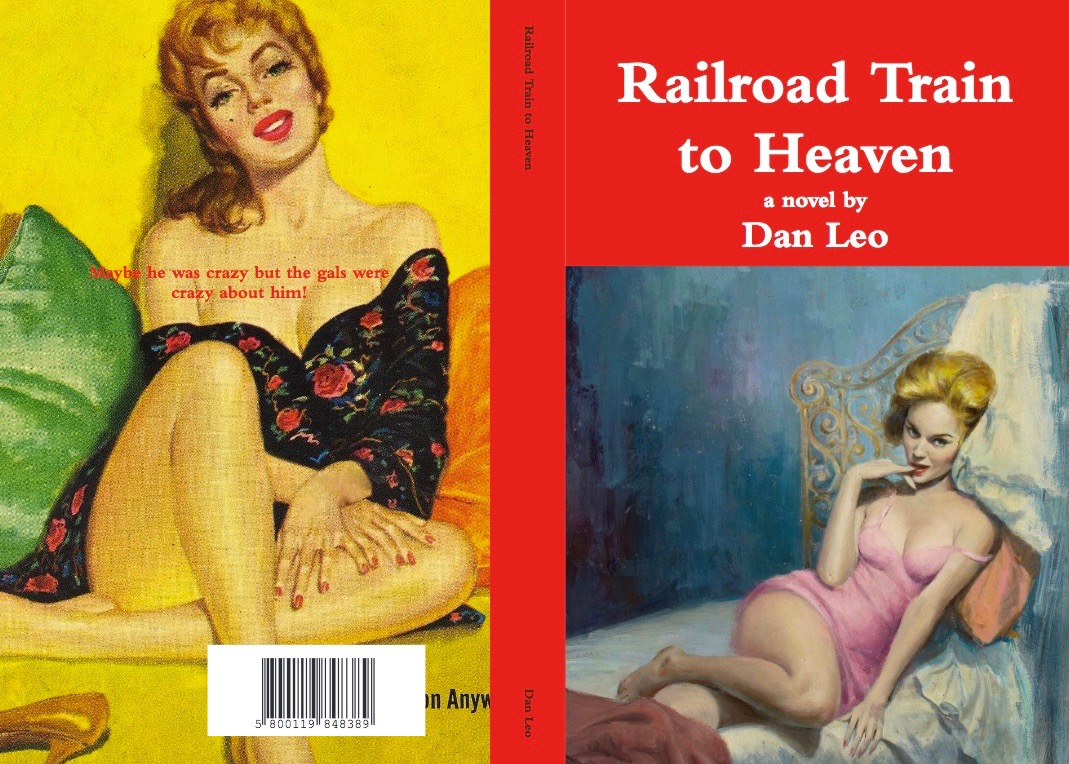“Where the hell ya takin’ me,” said Mickey Pumpernickel.
“Keep your shirt on,” said his fellow ventriloquist’s dummy, Mr. Fleeber. “Like I said, it’s a surprise.”
“Where the hell are we anyway? It’s spooky round here.”
“We are at the mysterious junction of Chinatown, Little Italy, Greenwich Village, and Fifth and Jipip.”
“Looks like just another slum to me.”
“Shaddap, we’re here already.”
Mr. Fleeber turned off the narrow dark street into a narrower and darker cobblestoned alleyway. Halfway down the alley a faint light glowed down near the ground on the left.
“Wished I brought my switchblade,” said Mickey, “or my sap.”
“Relax,” said Mr. Fleeber, “you ain’t gonna need no switchblade nor no sap. I been here a million times and ain’t never had no trouble.”
“It’s that million-and-first time ya gotta worry about,” said Mickey.
They reached the pale light, which turned out to be a dirty low-wattage light bulb in a wire-mesh fixture down the steps of a basement areaway.
“What gives?” said Mickey.
“I told ya I was gonna pay you back for helping me and Mo out,” said Mr. Fleeber. “This is the payback. Come on.”
The little dummy went down the steps and Mickey went with him.
Under the light bulb was a small door, only about four feet high. The door had what looked like a little shuttered window in it. Mr. Fleeber pressed a button to the side of the door, and the two dummies waited for somebody to answer the buzz.
“You got one of them Philip Morris Commanders?” said Mr. Fleeber.
“Sure,” said Mickey, and he took out his cigarettes. He lighted them both up with a Hotel St Crispian match, and the shutter on the other side of the window in the door slid open.
“Whatta we gotta do, stand out here all night?” said Mr. Fleeber.
The shutter closed, the door opened, and who was it but the Constable from the Punch and Judy show.
“Ah, Mr. Fleeber, my friend!”
“Whatta ya know, and a hidey ho,” said Mr. Fleeber, and he shook hands with the policeman. “Constable, this is my pal Mickey Pumpernickel. Mickey, this is the Constable. He may be a cop, but he ain’t all bad.”
Mickey shook hands with the constable.
“Nice to know ya, pal,” said Mickey. “I seen your work a few times, up in Ottawa when I played the Pantages there in the old days.”
“As have I seen you, Mr. Pumpernickel. My pleasure.”
“We gonna stand out here jabbering, or we gonna get outside some drinks?” said Mr. Fleeber.
“Of course,” said the marionette. “This way, gentlemen!”
He waved the two dummies in, and after closing the door and turning the latch he led them down a short passage into a crowded and noisy barroom.
All the old gang was there, or, if not all of them, a lot of them, at least the ones who were working in the city. For a good ten minutes Mickey shook hands and said hello, to Punch, to Judy, to various Japanese and Chinese puppets he hadn’t seen in years, along with the entire cast of the Mabel Beaton Marionettes, and a few oddballs like Maxie Doolittle (of “Maxie and Joe” fame) and Stumpy Mulligan (“Monty & Stumpy”) and T-Bone (“Gracie Molloy and T-Bone”). No humans, just puppets, marionettes and dummies.
“Awright,” said Mr. Fleeber finally, “enough jawboning and glad-handing, let’s get some drinks,” and they shoved over to the bar.
“Two shots of Three-in-One oil,” said Mr. Fleeber to the bartender, “outa here.” And he laid a crumpled dollar bill on the bar.
“Hey, no,” said Mickey, “let me get this.”
He reached his hand into his pocket, but Mr. Fleeber put his hand on Mickey’s arm.
“You want that arm broke? Tonight the drinks are on me.”
“Gee, Fleeber –”
“Gee nothing. You and McGee helped me and Mo out when we was in the gutter, now we got a good gig over to Mitzi’s thanks to you guys, and tonight your dough’s no good here.”
“Gee.”
“Hey, next time we come in, then you can spend your money. But tonight? Do me the favor.”
The bartender (it was that big puppet used to work all the midwestern state fairs, Gabbo the Gorilla) laid down the shots.
“Here’s to you, pal,” said Mr. Fleeber.
Mickey and Mr. Fleeber raised their glasses and emptied them in one go.
Mickey felt a gentle touch on his shoulder, and he turned around.
It was that cute girl marionette from the French puppet show, Madelon. How long had it been? Not since back in ’45, when McGee and Mickey played Paris with the Special Services. She and Mickey had had a thing for a few sweet short weeks that spring. A good thing.
“Long time no see, Mickey.”
“Too long, Madelon.”
She hadn’t aged a day. Say what you want about marionettes and dummies and puppets, you take good care of them, they aged a hell of a lot better than humans did, and Madelon’s skin looked freshly painted and varnished, her lips as red as cherries, her dark eyes deep and black as the night.
And Mickey had a feeling this was going to be a very good night, a very good night indeed.
{Kindly go here to read the “adult comix” version in A Flophouse Is Not a Home, illustrated by the one-and-only Rhoda Penmarq…}




